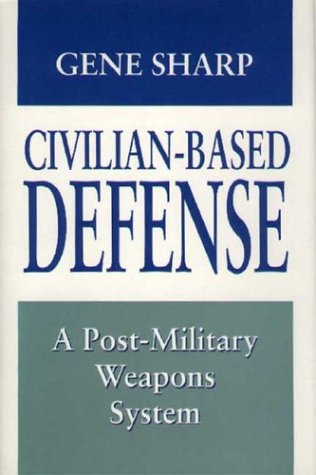Gene Sharp & Bruce Jenkins
Civilian-Based Defense - A Post-Military Weapons System (1990)

PREFACE
CIVILIAN-BASED DEFENSE is intended to be a substantive introduction to the developing policy of civilian-based defense. Instead of military weaponry, civilian-based defense applies the power of society itself to deter and defend against internal usurpations and foreign invaders. The weapons are psychological, social, economic, and political. They are wielded by the general population and the institutions of the society.
The propositions of this book are two: that civilian-based defense policies against internal takeovers and foreign aggression can be developed, and that dictatorships and oppression can be prevented and disintegrated by the capacity to wage powerful nonviolent struggle. Massive non cooperation and defiance would aim to prevent attackers from establishing effective control over the defending society, to deny the attackers their objectivesfand to subvert the reliability of the attackers of administrators and military forces.
Civilian-based defense is presented for research, investigation, and public and governmental evaluation. In some countries limited aspects of the policy have already been incorporated into existing defense policies.
My objective has been in part to prepare a book that stimulates thought among members of the general public who are searching for better answers to our defense problems. The aim has also been to present new information, conceptions, and options that merit attention by defense analysts, security specialists, government officials, military officers, strategists of nonviolent struggle, scholars, students, and members of society's voluntary organizations who would play indispensible roles in civilian-based defense.
This volume is focused on the broad security problems that may be faced by many countries, not only those of a single part of the world, in contrast to my earlier book Making Europe Unconquerable. Given a desire for democracy and independence, therefore, this presentation of civilian-based defense is of interest to very diverse countries. Al countries, no matter what their political or economic status, must concern themselves with the possibility of foreign invasion or internal usurpation. These are the problems addressed in thisbook. Using this broad presentation, the people of virtually a l l countries will be able to assess the possible relevance of civilian-based defense for their particular societies, each with its own traditions, security threats and military options.
This book was origrnally suggested by Sanford Thatcher of Princeton University Press some years ago. His encouragement, perceptive recommendations, critical comments, support, and patience have enabled the project finally to come to fruition. Since Mr. Thatcher's departure from the Press, Ms. Gail Ullman, as Social Science Editor, has ably seen the manuscript through the final stages. Charles Ault at the Press made superb editorial recommendations.
For the past year I have been extremely fortunate at the Albert Einstein Institution to have had the most able assistance of Bruce Jenkins in the preparation of this book. His research, perceptive substantive criticisms and suggestions, as well as his editorial skills, have made this a far better book than it would otherwise have been.
I am grateful to the Albert Einstein Institution and to its donors and staff for making this work possible. With expanded support for such organizations, many other studies of the nature and potential of nonviolent struggle as a substitute for violence against aggression, dicatorships, genocide, and oppression will become possible.
During the 1980s we witnessed the most important worldwide expansion of the practical use of nonviolent struggle that has ever occurred. From Tallinn to Nablus, Rangoon to Santiago, Pretoria to Prague, Beijing to Berlin, people around the world are ever more employing non-violent struggle to assert their rights for freedom, independence, and justice. Scholarly investigations, hard-headed assessments, and sophisticated strategic analyses are now needed to understand this technique further and to increase its effectiveness. This book is only one of many that need to be written on the nature, problems, and potential of nonviolent struggle. These will help us to assess what roles nonviolent struggle and civilian-based defense may play in confronting and solving the problems of dictatorship, genocide, oppression, and war.
Gene Sharp
Albert Einstein Institution
10 January 1990
Downloads and Links
- Download Civilian-Based Defense - A Post-Military Weapons System (1990) by Gene Sharp & Bruce Jenkins - PDF (7.5 MB) - 174 pages.
- Originally downloaded from the Albert Einstein Institute free-books section, with the PDF metadata now corrected.
- Read Civilian-Based Defense - A Post-Military Weapons System by Gene Sharp on The Internet Archive and download in different formats
- Web search for the book by ISBN:9780691078090
- Web search for the book by author and title
